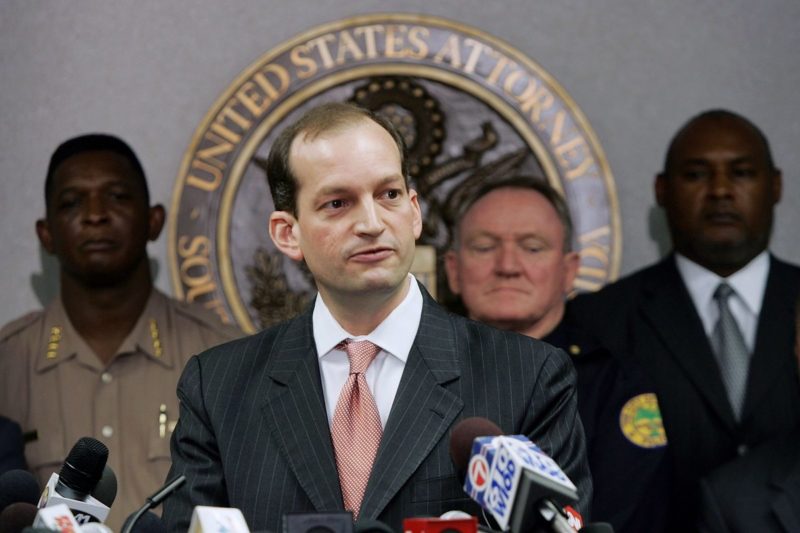Trump’s New Labor Nominee Supported Voter Suppression in 2004
"It is hard to believe that Mr. Acosta would now be nominated to lead a federal agency tasked with promoting lawful hiring practices and safe workplaces," said Kristen Clarke, executive director of the Lawyers’ Committee for Civil Rights Under Law.

President Trump on Thursday announced his new choice for labor secretary, R. Alexander Acosta, a former member of the National Labor Relations Board, current Florida law school dean, and potentially the cabinet’s first Latino.
The announcement came one day after Trump’s first pick, fast-food CEO Andrew Puzder, withdrew his bid to lead the Labor Department following months of controversy and new reports of defections by as many as a dozen Republican senators.
“I think he’ll be a tremendous secretary of labor,” Trump said briefly of Acosta in a marathon press conference that whipsawed among subjects, including the “dishonest media,” Russia, the sudden departure of National Security Adviser Michael Flynn, and Democrats’ opposition to his cabinet picks.
“This administration is running like a fine-tuned machine, despite the fact that I can’t get my cabinet approved,” Trump said.
Acosta, dean of the Florida International University College of Law, was not present.
“I look forward to carefully reviewing Mr. Acosta’s qualifications and background and meeting with him to discuss his plans and vision for the department,” Sen. Patty Murray (D-WA), top Democrat on the Senate Health, Education, Labor, and Pensions Committee, which will hold Acosta’s confirmation hearing, said in a statement. “I have some initial concerns about his record, and especially based on what we’ve seen in past nominees from President Trump, I will continue to insist on a rigorous and thorough vetting process in which senators get the information we need and have all reasonable questions answered.”
Acosta, as Trump noted, has undergone confirmation three times. Acosta earned undergraduate and law degrees from Harvard University and clerked for U.S. Supreme Court Justice Samuel A. Alito Jr. before the justice’s appointment to the Supreme Court. A former member of the National Labor Relations Board, Acosta served as an assistant attorney general under President George W. Bush.
“I don’t think you’ll see a lot of difference in his policy positions from Puzder,” Tammy McCutcheon, who served during the Bush administration as administrator of the Labor Department’s Wage and Hour Division, told Bloomberg. “He’s intense, hardworking, but I think in contrast to Puzder, he’s going to get things done more quietly.”
Opposition to Acosta might arise out of an Ohio voting rights case in which Acosta, then assistant attorney general, sided with Ohio Republicans allegedly engaging in a racially motivated and illegal tactic known as “vote caging,” according to a 2007 report.
Republicans had allegedly sent a mass mailing to people of color, mostly Democrats, according to McClatchy, to identify voters whose right to vote they could challenge. The Ohio GOP ultimately challenged the credentials of 23,000 mostly Black voters.
Acosta argued in a 2004 letter to U.S. District Judge Susan Dlott of Cincinnati that rejecting such challenges would “undermine the ability of election officials to enforce their own state laws,” and there must be a balance between “ballot access and ballot integrity.”
Kristen Clarke, executive director of the nonprofit Lawyers’ Committee for Civil Rights Under Law, said in a statement that Trump’s selection of Acosta left her “astonished.” She cited a 2008 report by the Department of Justice’s Office of the Inspector General that found actions taken during Acosta’s tenure politicized hiring decisions and violated Justice Department policy and federal law.
“It is hard to believe that Mr. Acosta would now be nominated to lead a federal agency tasked with promoting lawful hiring practices and safe workplaces,” Clarke said.
In the report, Acosta acknowledged that a hiring manager was “very loose with his language” and sometimes made inappropriate jokes. When that manager forwarded the office an email that described liking coffee that was “Mary Frances Berry style—black and bitter,” Acosta reportedly asked for a written apology. Berry, a Black woman, chaired the U.S. Commission on Civil Rights from November 1993 until late 2004.
Labor groups promised to scrutinize Acosta’s record.
“As we review Mr. Acosta’s record in the coming days, we’ll be looking for someone who respects workers, and who believes in—and is ready to uphold—the Labor Department’s mission ‘to foster … the welfare of the wage earners of the United States, to improve their working conditions, and to advance their opportunities for profitable employment,” Christine Owens, executive director of the National Employment Law Project, said in a statement.
Aiesha Meadows McLaurin, a Burger King worker from Chicago and a member of the Fight for $15 campaign, said in a statement activists would continue to oppose any Trump administration official who stands against raising the minimum wage.
“No matter who becomes labor secretary, we won’t back down for one second in our fight. We’ll keep taking to the streets, standing up and speaking out until we win $15 (per hour) and union rights for all,” she said.
